Contrary to what most readers of the written press think, satire has played an important role in the Tunisian media landscape as it always has done in publications such as ‘Le Canard Enchaîné’ and ‘Charlie Hebdo’ in France. In fact, satire was never more manifest in Tunisia, than it was preceding independence. Wielding this particular style as their sword, our journalistic knights, in upholding their belief in freedom of expression, sought to combat political correctness and continue the crusade against censorship, while cleverly evading prohibitions and taboos with great subtlety.
The Tunisian press, in all its forms, was stifled under the heavy censorship imposed on it during the 23-year presidency of the now ousted leader, Zine El-Abidine Ben Ali (1987-2011). In those murky and unsettled times, and under a callous dictatorship glorifying mediocrity and kowtowing, satire shone through like a light in the Tunisian blogosphere, showing its resistance through the thoughts and opinions published in articles by valiant cyber-dissidents and internet activists. The writings of the late Zouhair Yahyaoui, alias ‘Ettounsi’, are exemplary of this moment; this ‘Internet Martyr’ – a former prisoner of conscience condemned by a floundering justice system – was a fervent opponent of power via his famous column “Proxy” on his webzine ‘TUNeZINE.com’.
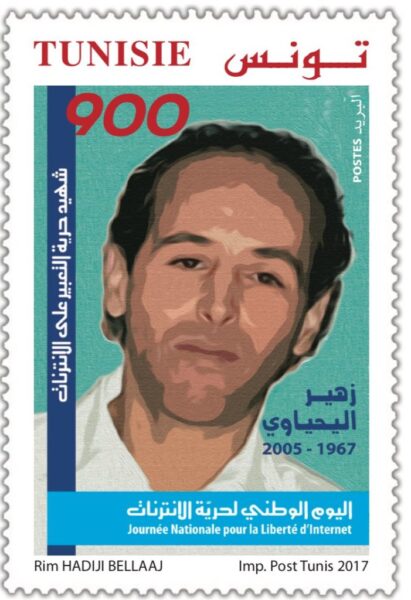
In contrast, overt criticism and (especially) satire were apparent in the written press under the 32-year-long authoritarian and individualistic regime of Habib Bourguiba, Tunisia’s first president, (1955-1987) in publications such as ‘El-Kanfoud’ (The Hedgehog), a mainstream satirical weekly newspaper founded by Habib Borji in 1962, which ran until 1964, ‘Es-Sitar’ (The Curtain), a bimonthly publication created by Mohamed Jaziri in 1956 which only appeared in print that year, and then again from 1960 and 1961), ‘El-Ifrit’ (The Ogre): a satirical journal published in 1957, ‘El-Imtaâ’ (Satisfaction), a funny, satirical newspaper published in Arabic by The Press Club at Menzel Temime Youth and Cultural Centre between 1979 and 1980 and then the weekly newspaper ‘Le Phare’ (The Lighthouse) by Abdejlil Behi.
It is impossible to mention satire in the Tunisian Press without mentioning the journalist, the late Mohamed Guelbi (Guelbi was a philosopher by profession who began his career at the TAP news agency, Tunis-Afrique-Presse in 1974).
With his tongue-in-cheek lyrical style, he always managed to escape the scrutiny of the law and censorship. Mohamed Guelbi was a writer for ‘Assabah’ (The Morning Post – the main Tunisian daily newspaper in Arabic founded on February 1st, 1951 by the late Habib Cheikhrouhou), and was renowned for his daily column ‘Lamha’ (The Wink).

Guelbi became famous for his legendary feature, ‘Harboucha’ (The Pill), but the critical column about the reigning power structure, published from 1977 to 1978 in the columns of the newspaper “Echaâb” (The People: the press organ of the Central Trade Union, the Tunisian General Labor Union), led to his arrest during the popular uprisings of January 1978. He was imprisoned and tortured, but released a few weeks later.
Around this same time (1970-1980), Taher Fezaâ caused a sensation with his columns in ‘Tunis Hebdo’ (a newspaper founded by M’hammed Ben Youssef which has appeared in print every Monday since 1973). Hatem Belhaj’s articles in the same publication in the 1990s also left their mark.
This article aims to shine a spotlight on the history of satirical press in Tunisia and its continuing saga, to wake the sleeping giant among Tunisian journalists.
The Golden Age of Satire à la tunisienne (1881 to the 1920s)
When delving into the archives of the National Library, we were overwhelmed by the number of satirical weeklies published in Tunisia in the days of the French Protectorate. Indeed, the printed press in Tunisia, whether in Arabic or in French, has always played the welcoming host to satirical caricatures and has with stinging relevance exposed the flaws in the political world. Admittedly, most of the newspapers and satirical magazines were in Arabic, but that did not prevent French language newspapers from making their contribution.
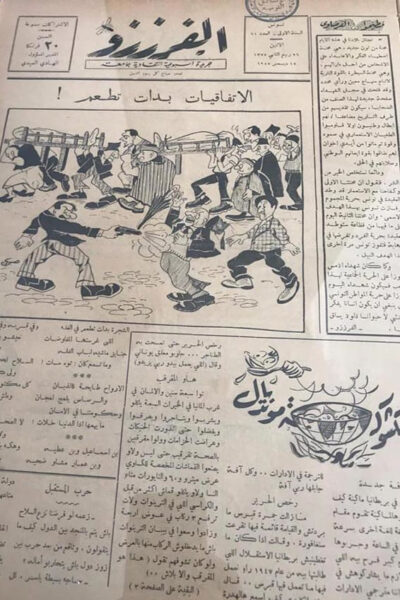
If the success of the satirical press started in 1906 with publications such as ‘El-Mozeêj’ (The Instigator) and ‘Tarwih Ennoufous’ (The Entertainer), however for many historians, it was the publication of ‘Kara-Kouz’ (The Clown, a satirical weekly founded by Stenk Razine which appeared in 1884) that truly galvanized satirical press in Tunisia.
In 1886, Jacob Hayek founded “Machrah el-Isdar”, a four page broadsheet in Hebrew which sold 400 copies a week. In 1887 “Le Charivari Tunisien” (an illustrated satirical and political Sunday paper, co-founded by JB Fray and Horace Meunier) landed on newspaper stands till 1889, alongside ‘Le Grelot Tunisien’, an illustrated satirical weekly paper whose editor was known as ‘Maurice’. Publication of ‘Le Grelot’ stopped one year later in 1888.
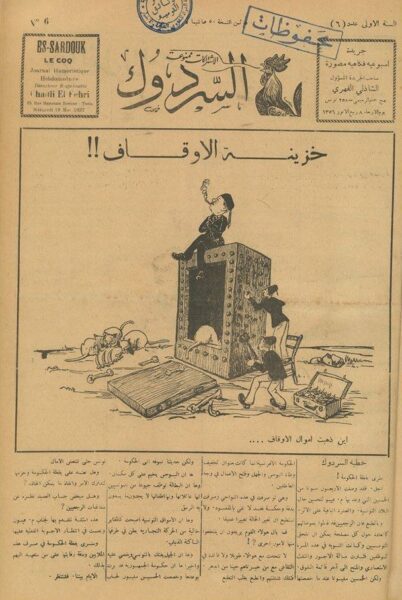
In 1888, Raphaël Smadja edited another Hebrew newspaper called ‘El-Moristane’ (The Hospital). Other satirical magazines published in those years include: ‘La Petite Tunisie’ (a mainstream satirical weekly founded by Emile Lacroix, was published between 1888 and 1938), ‘Tunisian pillory’ (an independent, satirical and political weekly founded by G. Sdnac came out in print in 1892 though only 43 issues appeared between 1892 and 1893),‘Le Tunisien’ (founded by Ali Bach Hamba and published between 1907 and 1912 was popular with readers due to its comical satirical notes), ‘Abou Guecha’ (a satirical weekly founded by Hachmi Tounsi, but it was only published for one year in 1908), ‘Weld el-Bled’ (The Compatriot: a light-hearted satirical weekly founded by Bachir Fourti, but published only throughout 1910, the year it was founded), ‘Abou Nouwâs’ (a funny satirical weekly newspaper renowned for its bitter sweet criticism founded by Slimen El Jadoui – originally a wool and carpet seller – and published between 1909 and 1910), ‘La Tunisie Illustrée’ (founded by Doctor Lemanski, a popular satirical monthly magazine between 1910 and1922), ‘Al-Modh’hek’ (The Comedian, a satirical and entertaining weekly founded by Abdallah Zarrouk, which was published between 1910 and 1911 and again between 1920 and 1923, ‘En-Nems’ (Nosy-Parker: a weekly founded in 1910 by Mohamed Ben el Haj Mahmoud Ettounsi ran until November 1911 then disappeared until 1920 when it ran for a further 17 years), ‘Gazdour’ (The Exhibitionist: a reformative monthly satirical publication founded by Hamouda Abassi in 1920), ‘El-Wided’ (Love: a comic satirical weekly founded by Chedly Ben Mohamed Beldi and published between 1920 and 1921), ‘Al-Moumathel’ (The Performer: a satirical weekly founded by Slouma Aberrazak and published from 1920 until December 15, 1924),’ El-Kairaouan’ (The Kairaouan Post: a witty satirical weekly founded by Jilani el Hmar and published for 4 years between 1920 and 1924), ‘Jeha’ (a humorous satirical weekly founded by Ahmed Ben Chikh Benaîssi in 1909 appeared irregularly in the first half of the 20th century: 1909-1911, 1920-1925, 1936-1942, and then from 1947 until 1950), ‘An-Nadim’ (The Companion: a particularly funny satirical weekly founded in 1921 by Houcine Al Jaziri, who was not only one of the greatest Tunisian journalists of his time but also one of the pioneers of the printed press, running for 22 years) and ‘Ez-Zahou’ (a comic satirical weekly founded by Othman Gharbi in 1921 and published until 1962).
The nationalist vague (1930 to 1957)
From 1930 to 1940, the Tunisian satirical press had a huge impact on the nationalist movement which was led by a host of political and iconic figures known collectively as ‘Taht Essour’ (a group of scathing avant-garde intellectuals who would meet up in a café of the same name situated within the walls of the Medina of Tunis in the popular district of Bab Souika).
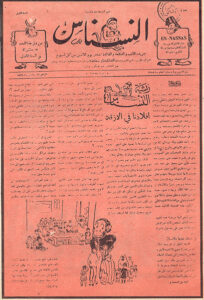
Writers of journalistic eminence such as the short story writer, playwright, lyricist, journalist and Tunisian cartoonist, Ali Douagi (born on January 4, 1909 and died May 27, 1949 in Tunis) who founded his own satirical weekly in Arabic, ‘Al-Sourour’ (Euphoria) in 1936, Abdelaziz Aroui, publisher of ‘Le Croissant’ (The Crescent) in 1930, an important weekly satirical newspaper focusing on politics and economics, Mohamed Mokhtar Saâda (1894 -1962) was a renowned Tunisian journalist who graduated from the University Ez-Zitouna. He was a member of the Tunisian theatrical group ‘Echahama El Arabiyy’ (Arabian Chivalry) and founded the satirical weekly ‘En-Nasnas’ (Nosy-Parker), and Hédi Laâbidi — began his career as a journalist at the age of 16 — and remains to this day one of the fathers of the militant press in Tunisia. He created ‘El-Ferzazzou’ (The Wasp), published between 1955 and 1956).
The great Tunisian poet and writer, Mustapha Khraïef (1909 – 1967) ran a column of literary criticism in Ali Douagi’s ‘Al-Sourour’ entitled ‘Mourajaât sahafia’ (Press Reviews). His articles (in Tunisian dialect) highlighted the monstrosities committed by French colonialists during the occupation.
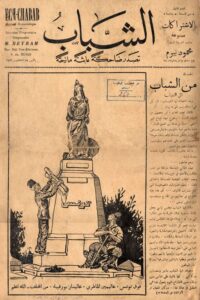
Of course there are more satirical publications which arose during this golden era of satirical journalism, namely: ‘The young Tunisian’, a politically satirical bi-weekly in defense of the Tunisian people founded by Sadok Elakhal and published between 1932 and 1936, ‘Petit tunisois’ (Little Tunisian, a satirical, political and literary daily newspaper founded by Mahmoud Aslan and published between 1934 and 1957), ‘El-Inchirah’ (The Joy, a satirical bimonthly founded in 1937 by Mohamed Mahmoud Ellouz), ‘Es-Sardouk’ (The Rooster, a witty illustrated satirical and weekly founded by Chedly Fehri in 1922. It reached a popularity peak between 1937 and 1939), ‘Sabrah’ (Patience, a satirical weekly founded by Taher Zarrouk and published between 1937 and 1939), ‘Zahou el-Bal’ (Ecstasy, a joyful satirical weekly founded by Arbi Turki, published in 1936), ‘Edifaâ’ (The Defender, an illustrated mainstream satirical weekly founded by Kacem Letaïef and published between 1936 and 1937), ‘Ech-Chabab’ (Young Voices, an amusing satirical and weekly created by Mahmoud Bayram, and published between 1936 and 1937), ‘Kol chay bel makchouf’ (Show your Hand, a satirically critical political weekly founded by Hedi Saïdi, in circulation between 1937 and 1939), ‘Al-Montakid’ (The Critic, a satirical, mainstream weekly founded by Amor Ata and published between 1938 and1939), ‘Al –Kachkoul’ (The Scarf, a satirical and political weekly in Arabic published in 1937 and founded by Hassan Ali Ayadi), ‘El-Anis’ (Cordiality, a critical satirical weekly founded by Mohamed Chabchoub, which ran from 1937 to 1955. Its publication was interrupted in 1937, 1938, 1947, and between 1949-1950, in 1953 and in 1955), ‘Belmakchouf’ (Transparency) (a newspaper founded by Taher Zaknani in March 1951), ‘Er-Rakib’ (The Overseer, a sharp and witty satirical weekly founded by Ali Mâaoui in 1948. It ran for just one year) and ‘Al-Nichan’ (Stripes, a satirical weekly founded by Abdelmalk Kborsli and only published in 1953).
The rise of ‘LerPesse’ (2013 to today)
The booming years of the Bourguiba rule (1955-87) and the gloomier ones under Ben Ali (1987-2011) for Tunisian satire have been discussed at the beginning of this article.
After the Jasmine Revolution, the well-known journalist Slim Boukhdir founded the infamous ‘El-Gattous’ (The Cat), on August 18, 2011, which was an acutely satirical weekly printed in Arabic every Thursday in a four-page tabloid format until 2012. One of its chef illustrators was Mohamed Adel Zaza, and one of the principal contributors was Taoufik Ben Brik (a journalist and writer known for his opposition to the regime of Ben Ali).
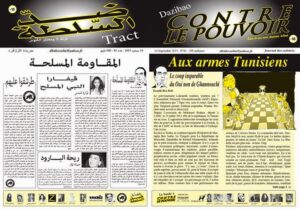
Taoufik Ben Brik also created a bilingual publication known as ‘Dazibao’: ‘Dhed essolta’ (Arabic), ‘Contre le Pouvoir’ (French). It was published from 2012 to 2014, with contributions from the anonymous caricaturist -Z-, whose aim was to glorify satire.
Since so many satirical newspapers and magazines rose and flourished at the end of the 19th Century, what would prevent satire rising like a phoenix once again from the ashes in the Tunisian press?
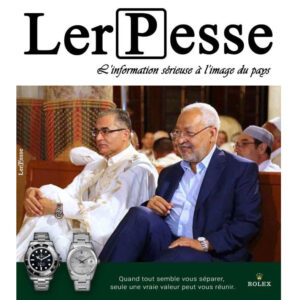
Since the evening of November 13th, 2013, our colleagues from ‘LerPesse’ (an anagram of La Presse), a joint magazine with the slogan: ‘The reality of our country realistically represented’, have been producing satirical articles (shared en masse on Facebook), which parody the national news with satirical wit. Media codes have been hijacked, a pinch of derision has been added, but this e-journal remains for the moment a real journalistic UFO, a dim light in the grayness of the Tunisian Web.
The Tunisian artistic and journalistic scene is full of talented cartoonists and graphic artists, and here, I shall name a few: Tawfik Omrane, Chedly Belkhamssa, Imed Ben Hmida, Habib Bouhawel, Seif Eddine Nechi, Mahjoub, Nadia Khiari alias ‘Willis from Tunis’, Adel Imbaya, -Z- (a “cartoonist” under X), Abdelkader Chelbi, ADENOV, Lotfi Ben Sassi alias “Bok-Bok”, etc.
The revolution of dignity brought cohesion to the great land of Ibnou Khaldoun, and the magical universe of illustration has produced a spring of such effervescence that forthcoming performers will be accurately portrayed. We are looking forward to the ‘grand retour’ of the satirical press.
Follow us on Facebook, Twitter and LinkedIn to see and interact with our latest contents.
If you like our analyses, events, publications and dossiers, sign up for our newsletter (twice a month) and consider supporting our work.


